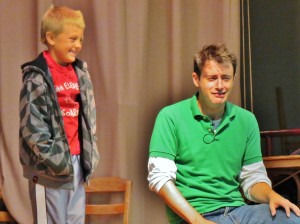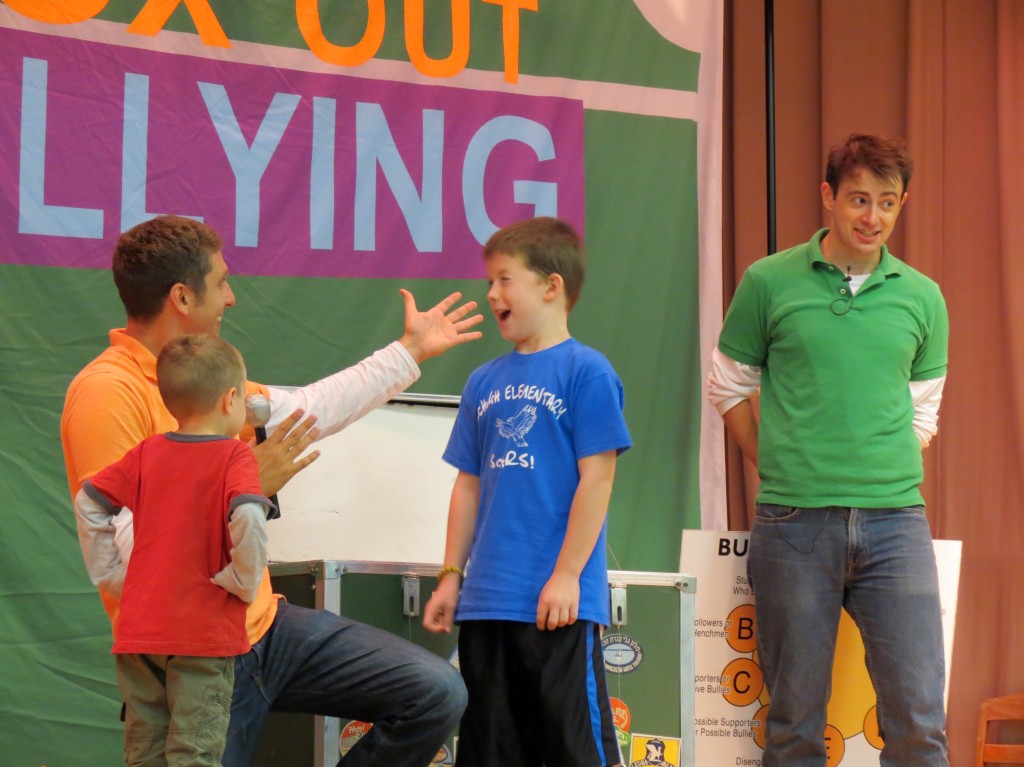By Danielle Tepper
 For the past five years, Lehigh Elementary School has implemented a bullying prevention program they call the “Konkrete Konnection.” This year, the Konkrete Konnection Committee decided it was time to give the program another jump-start and kicked it back into high gear with a Tuesday morning assembly that featured a comedic message from Box Out Bullying.
For the past five years, Lehigh Elementary School has implemented a bullying prevention program they call the “Konkrete Konnection.” This year, the Konkrete Konnection Committee decided it was time to give the program another jump-start and kicked it back into high gear with a Tuesday morning assembly that featured a comedic message from Box Out Bullying.
Based on the Olweus method, the Konkrete Konnection is an initiative that was started by the district as a way to address the issue head-on, according to LES guidance counselor Jennifer Borzillo. “It’s a data-driven way to research specific ways to prevent and combat bullying when it occurs,” she said. “We were all trained in it, the teachers, the cafeteria workers, even the bus drivers.”
The children have their own version of the training. Every other week, they attend “Class Climate” meetings where they are encouraged to discuss their issues and concerns.
“The thing with bullying is, as hard as we try, we can’t stop it from happening. As much as we wish we had that magic wand to eliminate it, it’s just really unrealistic,” said Borzillo. “But the goal of the program is to lessen the number of incidents, to be preventative in nature, and then when something does arise, our promise to our students is that we will address the issue each and every time it is brought to our attention.”
Box Out Bullying, an NYC-based operation with offices in Lancaster, strives to help schools do just that with their innovative way of outlining the four rules of bullying: 1) Don’t bully. 2) Help others who are being bullied. 3) Include other students who are being left out. 4) Tell an adult at school and an adult at home when you know someone is being bullied.
LES hosted Jeremy Rubenstein and Ryan Feyk (also known as “cousins Tom and Jerry”) on Sept. 24 for two hour-long sessions, a 9:15 a.m. program aimed at kindergarten through third grade and a 1:45 program for grades four to six. The morning session was full of slapstick comedy and the loud, in-unison cheering commonly found amongst little ones who are happy to be out of class.
Rubenstein founded the interactive two-man show in 2008 by combining his background in education and theater.
“I saw that there was a big need for it,” he said. “Often times in my teaching experience, not enough time is given to emotional intelligence. It’s not just the message, but the way you present the message.”
Rubenstein needed someone who could be “heartfelt and silly” to join him. He met Feyk and accepted him onto the team.
“What drew me to Ryan is that he has a background in theater for young audiences too,” said Rubenstein. “The characters require an enormous amount of empathy towards kids.”
The ‘characters’ of Tom and Jerry are cousins who use their own bullying conflict from on a family vacation in Georgia to illustrate the four rules of bullying. At least, that’s their story for their younger audience.
“There are three separate levels,” explained Rubenstein. “A fifth grader is much different than a 5-year-old. We have to change it to reflect their maturity level. This is more than a once-and-done show because those don’t work.”
Rubenstein provides much more than just educational entertainment to the schools he visits: “What we want to try to do is integrate bullying prevention into the curriculum, so we include over 90 pages of activities and lesson plans, study guides, and parent resources to make it a truly comprehensive, organic experience.
Box Out Bullying has been touring for five years now and they visit approximately 100,000 students a year. They’ve found that the issues and concerns facing today’s kids are the same nationwide, but so, they believe, are the solutions.
The most rewarding part for them has been the students’ positive response.
“Sometimes we’ll ask the kids to tell us their favorite part. They’ll write a story or draw a picture and getting those back—having the kids confide in us and share with us,” said Rubenstein. “You know, by the end, we’re kind of like rock stars honestly. We’re ‘Tom and Jerry.’ It’s downright making a difference. I sleep easy at night.”
“For me, it’s seeing that most children already have these natural inclinations to be compassionate or empathetic,” added Ryan. “They want to, they feel better when they do and they know that they do, it’s mainly just feeling like they have a space where it’s safe to do that. It’s not a new idea to them.”









